Latest Contributions
Pindi Memoirs by a Sikh Son of the Soil - 5
Category:
Tags:
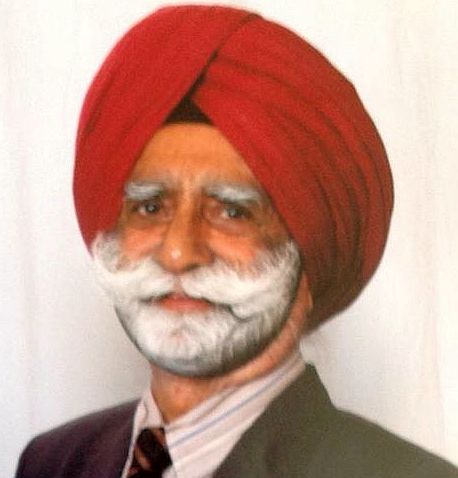
Kanwarjit Singh Malik was born in Rawalpindi in 1930. His family moved to India at the time of Partition in 1947. He joined the Flying Club in Jalandhar, and was later selected by the Indian Air Force. After the retirement from the Air Force, he served as a senior captain in Air India and Air Lanka. He got married in 1961, In 2011, when they were living in Chandigarh, his wife fell ill, and passed away in spite of the best available medical aid. Then, his daughters, who live in Dubai, California and Hong Kong, requested him to move back to his old flat in Mumbai, as it was easier for them to visit him there. He passed away in Mumbai on July 24th, 2017 fulfilling his desire to visit his Rawalpindi one last tim.
Editor's note: After Captain Malik's passing away, this story has been finalized with the help of Gurpreet Singh Anand, who had accompanied Captain Malik to Rawalpindi. In the original text, Captain Malik had quoted Gurpreet: "For us brothers who had got a 30-day visa [for Pakistan] after much persuasion the trip was solely to go down memory lane. I am content we made your dream come true, for there is no greater satisfaction than taking someone to the place he is born and yearned for all his life .That one's wish is fulfilled is indeed a blessing."
Gurpreet has facilitated another story about pre-Partition Rawalpindi, available here.
From a Boy to an Old Man ... The visit back home...
My great grandfather Malik Khazan Singh was the 16th , and I am the 19th descendent of Ram Chand. He was the founder of this clan from Dera Khalsa (earlier Kalal Pura) before Princess Managala conferred it as bakshish (gift) to our ancestors for services rendered with Malkiat and the title Malik. Since then we are Maliks.
The Maliks and Bhagats are Ahluwalia by sub-caste. Initially, they were professional brewers of the finest liquor. Because of this profession, Khatri and other communities would not give nor accept their daughters in marriage, no matter how affluent they may have been. Kapurthala and Hoshiarpur districts along with Ludhiana had been their home for centuries where they learnt this trade and then spread all across India. No one knows how they made Dera Khalsa their home.
Malik Khazan Singh joined Maharaja Ranjit Singh's cavalry, and took part in various missions until the British defeated the Sikhs due to betrayal by the Dogras. The Sikh army was disbanded, and Malik Khazan Singh returned to Dera Khalsa. When his father died, he was well equipped with the dual knowledge of trade of contractors and of brewers. He travelled with the British army in the Afghan War, and earned three lakh rupees. In addition to his dual profession, Malik Khazan Singh became a contractor for conveying Dak (letters and other posted material) in Rawalpindi district, and also got a license to supply liquor to the British canteens.
At the age of 85, I came to Pindi - the place of my birth. The Anand brothers from New Delhi guided me, and Sylvia Baig from Pindi sponsored me. Both parties were helpful beyond description. I ended up obtaining my visa in Hong Kong, since I was there visiting my younger daughter. Mr Memon from the Pakistan Consulate obliged me. He read my earlier memoirs, and with the assistance of the staff, helped in getting the visa to Pakistan. I have yet to thank them personally, which I will do on my next visit.
Without any prior planning, at the invitation of Gurpreet Anand and his brother, Tejinder Anand, we flew from Delhi to Amritsar, and entered Pakistan via the Atari-Wagah border. We were welcomed by Shahid Shabbir, and many of his companions who had come all the way from Islamabad.
On the return journey from my city of birth, we travelled on the other highway, avoiding several towns via the bypass. The old Grand Trunk Road, on which I had travelled so many times with my parents, has been upgraded to a highway, and was overcrowded. Curious onlookers were looking at us as now there are practically no Hindus and Sikhs in Pakistan. Though upon seeing us, people welcomed us with tea and juice.
The reception area in the hotel was usual style--rooms allotted. We fixed a visit to Panja Sahib in Hasan Abdal - the place I had visited many times with my mother or my uncle Amar Nath.
After a night's rest, and after 71 years, I (we) set out early for the Panja Sahib shrine located in the historical town of Hasan Abdal. This shrine is of particular importance to us Sikhs. It is believed that the handprint of Guru Nanak is imprinted on a boulder at this Gurdwara. We used to park the car at Vali Kandheri where this shrine is located. Now all we could see from there were houses and shops surrounding the Gurdwara with no open spaces anymore. The Sikh residents had long left during the Partition of the sub-continent.
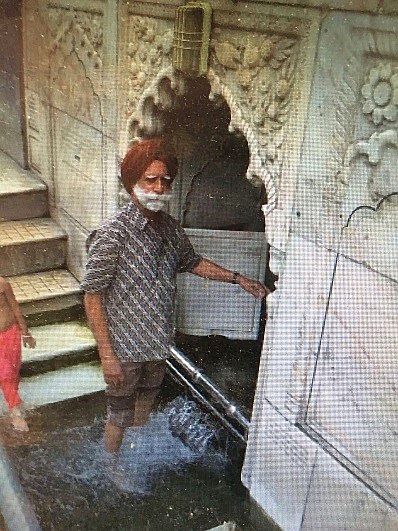
Captain Malik at the rock believed to have the hand print of Sri Guru Nanak Sahib Ji imprinted on it. 2015.
At the entrance, the police in civilian attire first checked my passport, and questioned me about my hosts who had sponsored me. Times had changed - my family were once prominent citizens of Rawalpindi.
On the way back, the Anands had warned me that we would be questioned in the hotel as well. Another police party was awaiting my arrival in the hotel. No sooner did we get into our rooms than they rang the bell. I was questioned. I felt I was being interrogated as a spy.
The next day we went to Kalar Saidan, the village (town now) where we were accompanied by Shabbir, who had surveyed most areas where we were visiting.
In Kalar Saidan, I visited the Anand ancestral home, the school that their ancestors built and where they studied, and the shops they owned. The burnt out Gurdwara sahib of 1947 stands abandoned today. It still shows visible signs of the black soot that must have accumulated above the prakash asthan.
Later, I went to sites where Sikhs and Hindus had been victim to atrocities, and Gurdwaras set ablaze. We took a walking tour of the bazar where everything appeared just as it had been. I met many citizens of Sydan, including old traders, and one quail vendor exercising his bird for a prearranged fight.
Accompanied by Shabbir and the Anand brothers, we went to the imposing Sir Baba Khem Singh Bedi's haveli. The compound consisted of stables, a large ground and, of course, quarters for the large number of retainers. There must have been a Gurdwara for the Nishan Sahib, Bedi Sahib's private functions as he was a highly revered person, being a direct descendent of Guru Nanak. There were murals and paintings of Hindu and Sikh deities.
People were mostly from J&\;K or areas of District Amritsar. These people did most damage during Rrots of March and August 1947 around District Rawalpindi, Jhelum and Gujarat besides Sialkot.
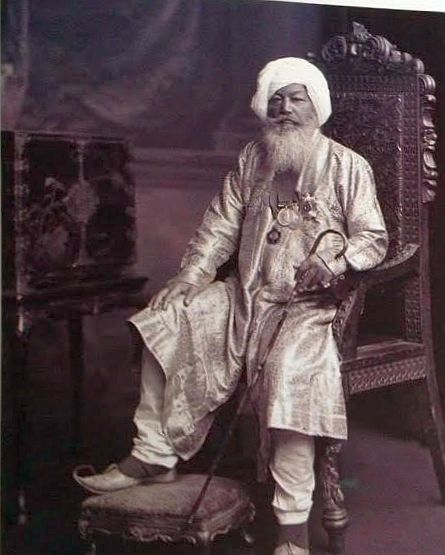
Khem Singh Bedi KCIE claims he was a direct descendant of Guru Nanak, a leader, founder of the Singh Sabha in 1873.
It was getting late. I was keen to visit my ancestral village, Dera Khalsa. We headed that way. After traveling a few miles, we came across a road sign that read Dera Khalsa. We stopped to take pictures. I was getting excited as I was nearing my home but Shabbir was doubtful saying that I could be denied entry as it was a trouble spot swamped with police. He was right. At the first police post, we were stopped and had to turn back. We then drove to Chakwal, and photographed historic Gurdwaras.
On our return, we planned a trip through Raja Bazar, Kartar Pura and Nehru Road but it was already quite late.
On the second day, along with Shabbir, I took photographs of Hindu and Sikh holy places, which are now in ruins due to neglect. We then went with Chaudhary Fakher to Said Pur, which has now been developed into a well-planned picnic spot. It was heartening to see that a Gurdwara, temple and mosque still co-exist in harmony but the five ponds had dried up. I had a sumptuous meal with Beta Fakher. I was older to his father who was a noble soul, and laid a wreath at the grave of this much-admired resident of Rawalpindi. The Fakher family once owned vast tracts of land.
The same evening, we bought some books from a prominent book store in the Cantonment. On the way back, we saw Gordon College and the old Holy Family Hospital, which is now a boys' school. I saw the ruins of my uncle's Mall Hotel, which is now converted into a car park. Our house on Mall Road has been rebuilt to accommodate the PIA Head Office.
The entire Chaudhary family was known to us Maliks from the time of their conversion to Islam. At his home in Islamabad, I gifted his little daughter with the customary money as per tradition in the Malik family.
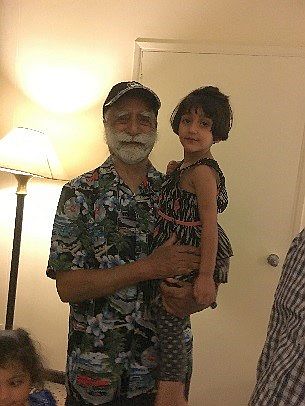
Choudhary family is very well known in Rawalpindi. Captain Malik with Granddaughter of Choudhary Sahib in their home. 2015.
As a child, I once received money from Sir Sikander Hayat Khan to purchase kites. He was the Chief Minister of Punjab with a 99.9% vote. I believe if he had not passed away so young, the partition of the country would not have happened.
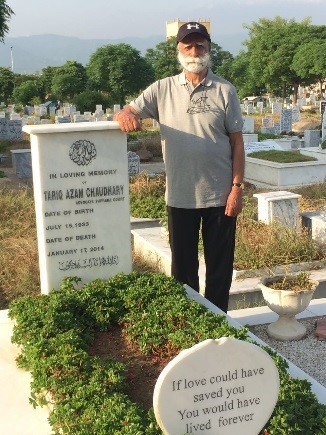
Captain Malik at the grave of Rafiq Ahmed Khan, a Pindiwal, a Facebook friend. 2015.
We made this trip unannounced but still had many visitors in the hotel including Amjad Zia Mughal, Khawaja Rashid Sahib, and Emad Ali, a journalist. I was presented a pictorial book of Rawalpindi, which was bought by Sylvia but presented to me at the hotel by the author himself. I also was given Timber, fruit like peas from a wild tree which is put in chutney to make it tastier, and black mushrooms - things that were memories from my childhood that I had asked for.
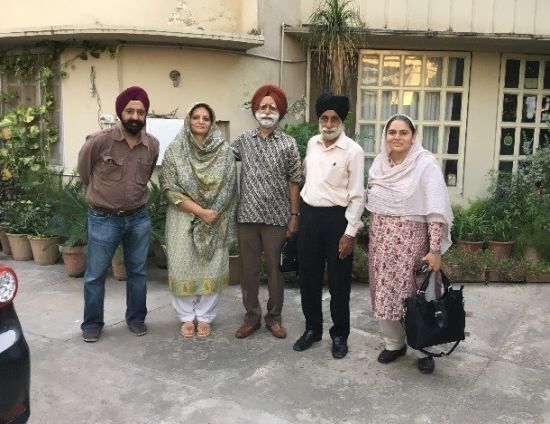
L to R: Gurpreet Singh Anand, Sylvia's elder sister Dolly, Captain Malik, Gurpreet Singh Anand's older brother Navtej Singh Anand, oolder daughter of Sylvia. Rawalpindi. 2015.
The next two days we spent with beti Dolly (Sylvia), as the sweltering heat was taking its toll on us. We drove past our bungalow on Asghar Mall Road which joined up with Nehru Road. I remembered all this and would often dream of flying kites from the open grounds, while walking through fields. They are no longer in existence since the population of Rawalpindi with satellite Islamabad is over five million. What a change, there are no open spaces anywhere. Along with the Anand brothers, I was invited to meals at her house where I met her entire family, brother and elder sister.
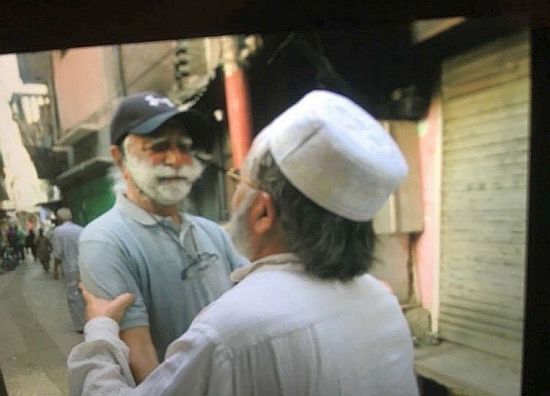
An unknown shopkeeper in Pindi who came out seeing a Sikh, hugged Captain Malik, and requested me to have Tea or Juice. 2015.
Small shops and street vendors occupy every possible space. Seeing me in the company of my ‘Muslim daughter', the local people offered me a cup of tea or invited me to a meal at their home. These sights made me reminiscent and feel sad that my country had been partitioned. My childhood home was now on the other side of the border, separated by a line drawn out of hatred and animosity leaving me with just nostalgic memories.
The following day accompanied by Sylvia, I decided to go to both the Sanatan School and the Khalsa School of my elders.
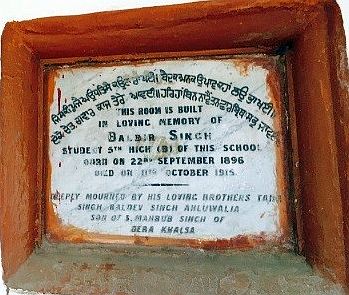
Marble plaque of my Khalsa High School, Rawal Pindi.
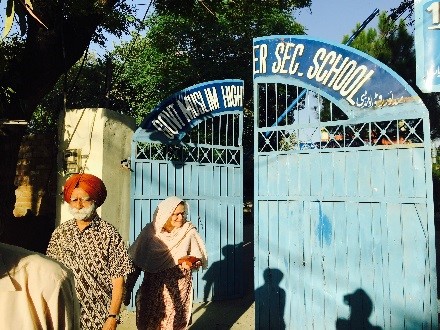
Captain Malik and Dolly - the school where I studied in Rawal Pindi. 2015.
Each time I passed my ancestral home on Chowk Said Pur Road, Sylvia would ask me if I wanted to go inside. I refrained from answering, but one day I finally yielded. She took permission from the Sheikhs, the present owners for me to see my home from the inside. Even this kothi has now been divided by the brothers, and another one has come up in the compound and over the adjacent land owned by my father. The Sheikhs are the owners of five oil mills in Rawalpindi. Just as in India, there is mainly unplanned construction everywhere.
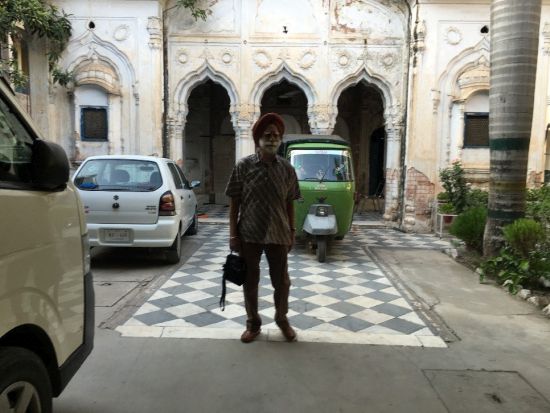
Captain Malik standing in the periphery of his home he had left in 1947. Rawalpindi. 2015.
Anyway, back to our kothi. At the appointed hour, accompanied by Sylvia and the Anands, I went to visit my home. We entered from the gate on Asghar Mal,l as the other gate from Saidpur side was now blocked. We were escorted by a male domestic help and introduced to the owner Mr. Sheikh and his wife, who were humble and courteous. I returned to the home that I had left as a youngster 70 years ago, an old man. I had become a stranger to my home, and to the city of my birth which my ancestors had spent a lifetime building and providing its amenities.
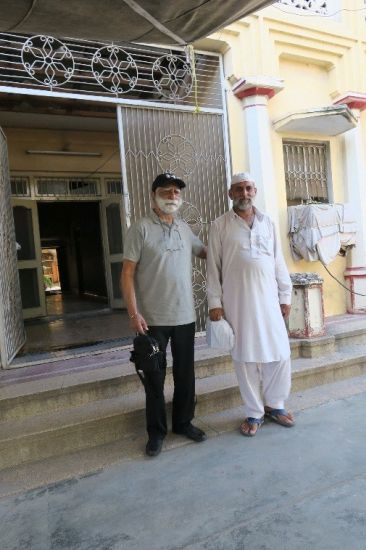
Captain Malik with the attendant of the family who now occupy his house in Rawal Pindi. 2015.
Most graciously, Mrs. Sheikh asked me to describe my house as it had been then. I started describing, and she and her sons were amazed that I remembered minute details. But, how could I forget? My mother laid the foundation stone, and I had accompanied her as a five or six year old. My uncle supervised the building of this home and we moved there in 1936 or 1937. It was our home until Partition.
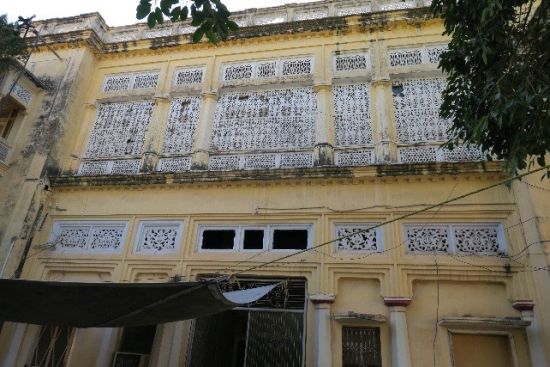
A of view of the house that Captain Malik grew up in until 1947. Holds millions of memories.
I looked up and saw the wooden ceilings now partially ruined with the passage of time. I suggested repairs to the present occupants.
Gurpreet Anand says, "At this juncture I took close up pictures of your eyes which were moist with emotion but you were not letting yourself go." I had a lump in my throat and feel that this was a defining moment of the visit. We noticed that even after all these years the railings of the house still had the Guru Khanda intact signifying a Sikh house.
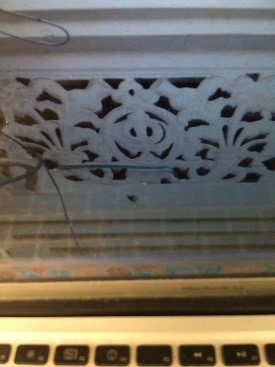
‘Khanda' Holy insignia of Captain Malik's family has not been destroyed. Still visible 70 years later. 2015.
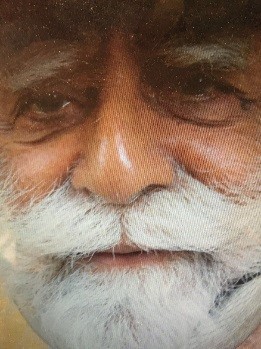
Captain Malik's eyes making a great effort to hold back tears, as he looked around in the house where he once pranced as a kid.
After refreshments, we began the "tour" of the kothi. Mrs Sheikh offered to show us around. My eldest brother, while on leave, used to stay in one room. Even Harinder stayed there before he married Suriya. I have already mentioned this love story between Suriya and Harinder (Sulaudeen Iqbal) of Abotabad in my earlier memoir no. 3, available here. There was a separate kitchen for the first floor, and there were stairs leading to it. Mrs. Sheikh was surprised at my vivid recollection of the interior of the house.
While bidding farewell, I requested some soil from the compound, which her eldest son provided in a plastic bag.
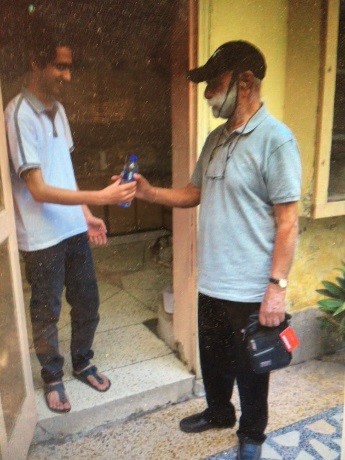
Saying goodbye to the youngest male habitant of the family and requesting him to hence forth take care of the house which once belonged to Captain Malik. 2015.
Mrs. Sheikh then reminded me of the well, which was in a corner, and which my mother had got dug for emergencies. We used to pull buckets on pulleys of different kinds to build muscles. Even my little friends used to do that. Now it is motor-operated. Mrs. Sheikh's son gave me a bottle of water from the well. As Gurpreet Anand adds here that the well water was not mere water but amrit for it was these waters that acted as elixir for the family from 1937 to 1947.
This kothi was an important landmark house where so many meetings of dignitaries of Rawalpindi took place. My father was a member of the Municipal Committee as was his Uncle, Sardar Mohan Singh Malik, who had been member and president. He resided on Edwards Road in the Cantonment, and passed away in 1936.
As a person born on 7 Nov 1930 on a cold, rainy night in the ajanti of my great grandfather (Malik Khazan Singh) on Nehru Road, Rawalpindi in Pre-Partition India, I felt proud to land up in the city that was now just in my dreams. My dream did indeed come true.
The house of my birth and the buildings around it were destroyed in cracker/bomb blasts in which five people died. I remember in Lahore, the city of gardens, education and cinemas, people used to say "If you haven't seen Lahore, you haven't even been born" but I proudly say that one who has not tasted the water of Pindi has not yet been born. Living in Pindi was a unique experience of Central Asia, where Hindu, Muslim, Sikh, Christian and Parsi communities lived in undisturbed complete harmony for centuries.
Since this is my fifth and concluding memoir, I must pay my respects to Late Brother Rafique Sahib, who was my inspiration, Col. Sahib for posting the earlier ones, General Taheer for not visiting him and the lady who saw Fatima Jinnah University come up brick by brick. It was the residence of Sardar Bahadur Mohan Singh earlier, and so many others abroad. I do apologise for late responses to comments posted to my blogs earlier. [This paragraph relates to http://nativepakistan.com/pindi-memoirs-by-a-sikh-son-of-the-soil-part-1-rawalpindi-blog/¸where Captain Malik's stories were posted earlier.)

Walking alone Capt. Kanwarjit Singh Malik on the paths and streets of Rawal Pindi where he came back after 70 years. Alas ! Never ever to return again.
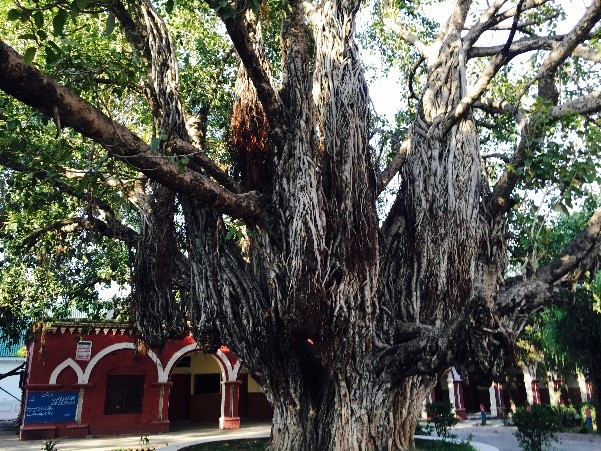
Khalsa School Rawal Pindi. 2015.
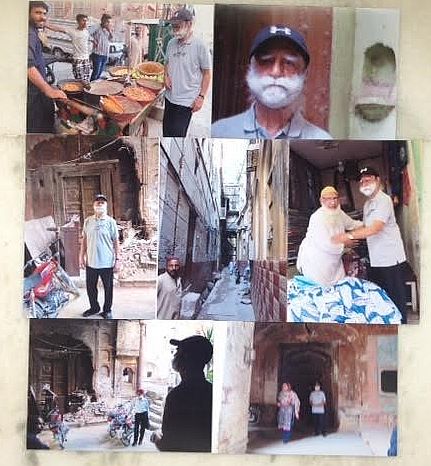
On the way to Saidpura Darwaza and outside photograph of Wada Ghar. Residence of Captain Malik's grandfather Malik Khazan Singh.
My journey feels complete now ...
______________________________________
© Divya Malik 2018
Comments
My father was born in Dera
Add new comment